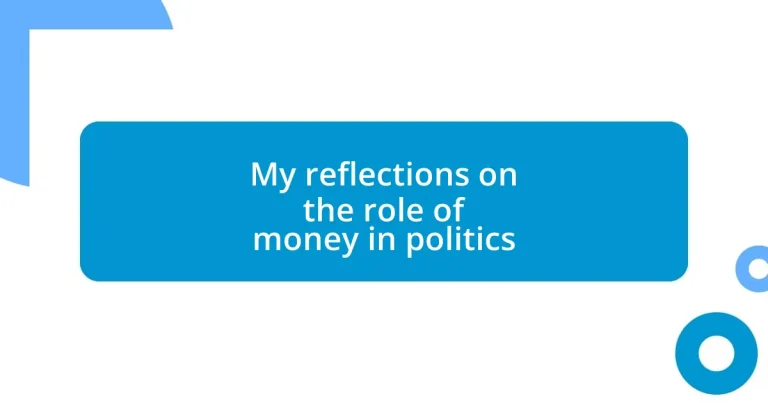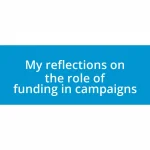Key takeaways:
- Campaign financing creates disparities, allowing well-funded candidates to dominate visibility and influence voter perception, often at the expense of genuine ideas.
- The relationship between money and corruption poses a significant threat to political integrity, with financial power often overshadowing the needs of the community.
- Reforming political finance through publicly funded campaigns, contribution limits, and increased transparency can enhance authentic democratic participation and rebuild trust in the system.
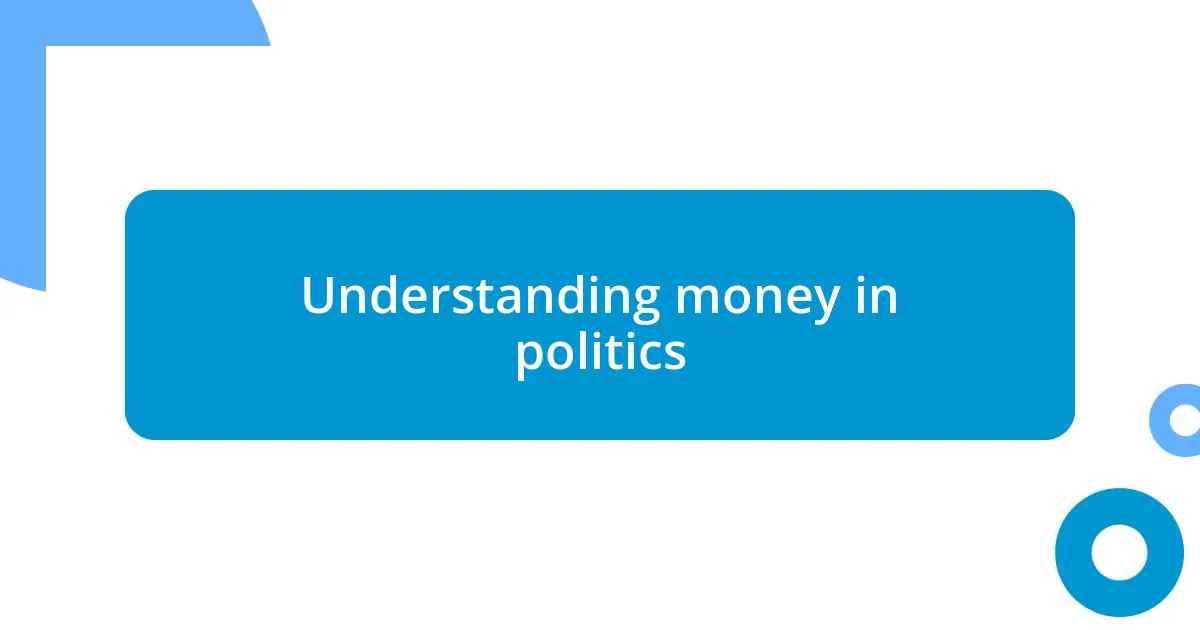
Understanding money in politics
Money in politics is a powerful force that influences decisions, policies, and ultimately the direction of a nation. I often find myself reflecting on instances where a well-funded campaign seems to overshadow genuine ideas. Have you ever noticed how certain issues take center stage simply because they have deep-pocketed advocates behind them? It can be disheartening to think that money often speaks louder than the collective voice of the people.
In my experience, I’ve seen firsthand how donations can shape political agendas. There was a local election in my town where a candidate with limited resources struggled against an opponent who had large donations pouring in from special interest groups. This discrepancy highlighted the troubling reality: financial backing can often dictate whose message gets heard. It really makes you question, are we electing representatives or merely endorsing the highest bidder?
As I engage in conversations about the role of money in politics, I’ve come to appreciate the complexity of campaign financing. The regulations and loopholes surrounding donations often create a tangled web that feels impossible to navigate. I can’t help but feel that this system alienates average citizens who want to participate in democracy. What do you think – does this financial landscape discourage authentic participation, or does it encourage it by providing a platform for voices that would otherwise go unheard? It’s a thought-provoking dilemma that many of us grapple with in today’s political climate.
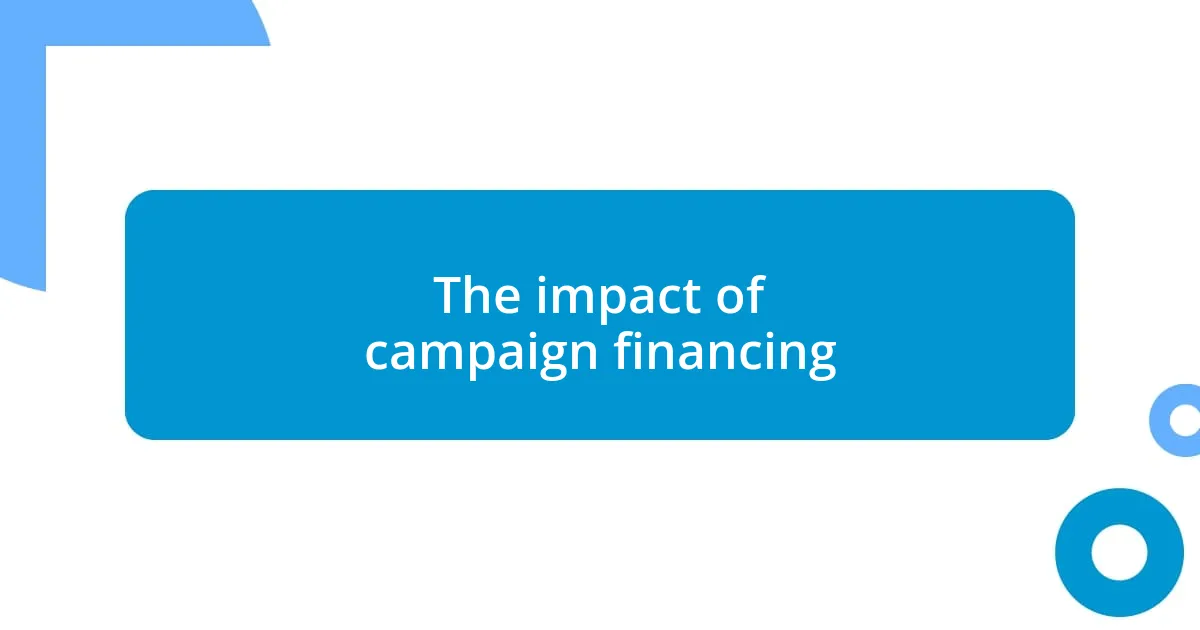
The impact of campaign financing
Campaign financing has a profound impact on the political landscape, shaping not only who runs for office but also the narratives that resonate with voters. I remember a particular town hall meeting where one candidate dominated the dialogue, largely because they had the funds to craft slick advertisements and host numerous events. This experience really drove home the point that without adequate financing, even the most passionate and qualified individuals might struggle to get their message across.
- Campaign financing can create disparities in visibility among candidates.
- Financial resources allow for more robust outreach and engagement strategies.
- Wealthy donors or special interest groups can exert undue influence over political agendas.
- The reliance on campaign funds may skew priorities toward interests that align with backers rather than constituents.
- The focus on fundraising often diverts attention from pressing issues that matter to everyday voters.
Reflecting on these points, I can’t help but feel a sense of urgency for reform. It’s crucial to recognize how this financial dynamic shapes not just elections, but the very fabric of our democracy.
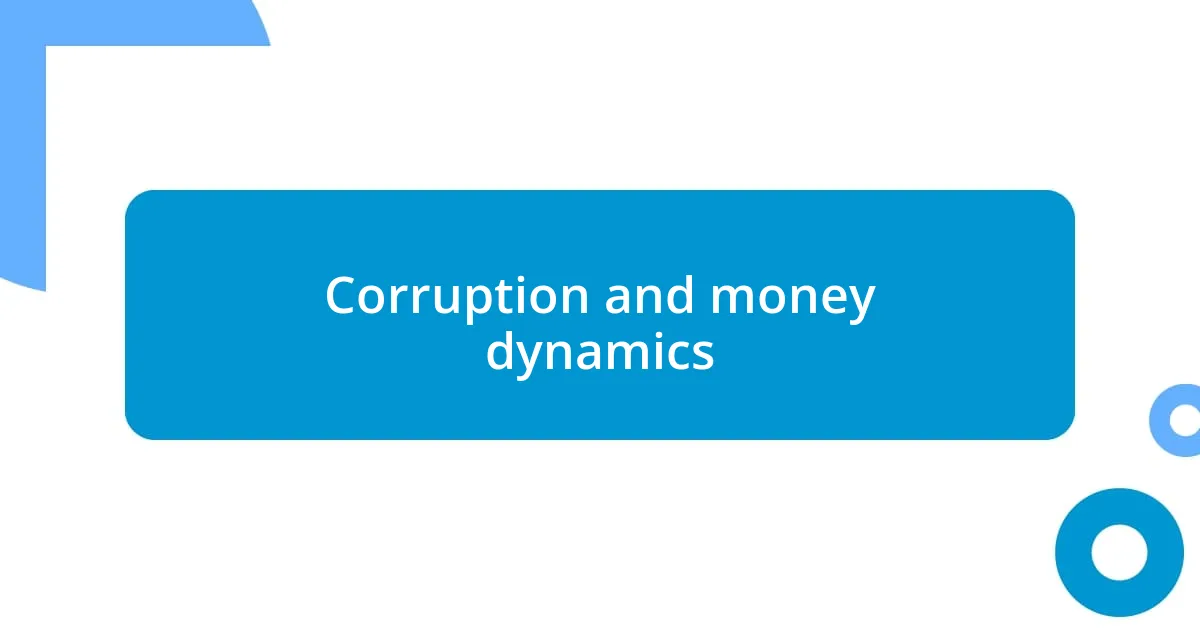
Corruption and money dynamics
The relationship between money and corruption in politics is intricate and often alarming. I remember watching a documentary on political donations that focused on a scandal involving a prominent lobbyist. The sheer volume of money exchanged for policy favors shook me to my core. It made me realize that when money enters the equation, the lines between legitimate advocacy and corruption can blur, leading to a significant erosion of trust in our political institutions.
In many instances, I’ve encountered grassroots organizations fighting against well-funded political machines. One local activist group I supported had to rely on small donations and community engagement to promote their cause, only to see their efforts eclipsed by a rival campaign backed by deep-pocket donors. It struck me how disheartening it is when corruption, fueled by financial power, diminishes the voices of those who truly represent the community’s needs and aspirations. How can we expect genuine representation when money holds sway?
These dynamics highlight a disconcerting reality: the more money in politics, the more opportunities for corruption emerge. I often think about my own experiences voting in local elections where candidates with the most funding often overshadow those with less corrupt practices but more authentic messages. The desire for transparency and accountability in campaign financing feels increasingly urgent. Do we have the power to demand change, or are we merely spectators in a game where monetary influence reigns supreme?
| Factors | Impact |
|---|---|
| Campaign Contributions | Exacerbate inequality among candidates |
| Lobbying | Results in policy outcomes favoring specific interests |
| Transparency Regulations | Essential to mitigate corruption dynamics |
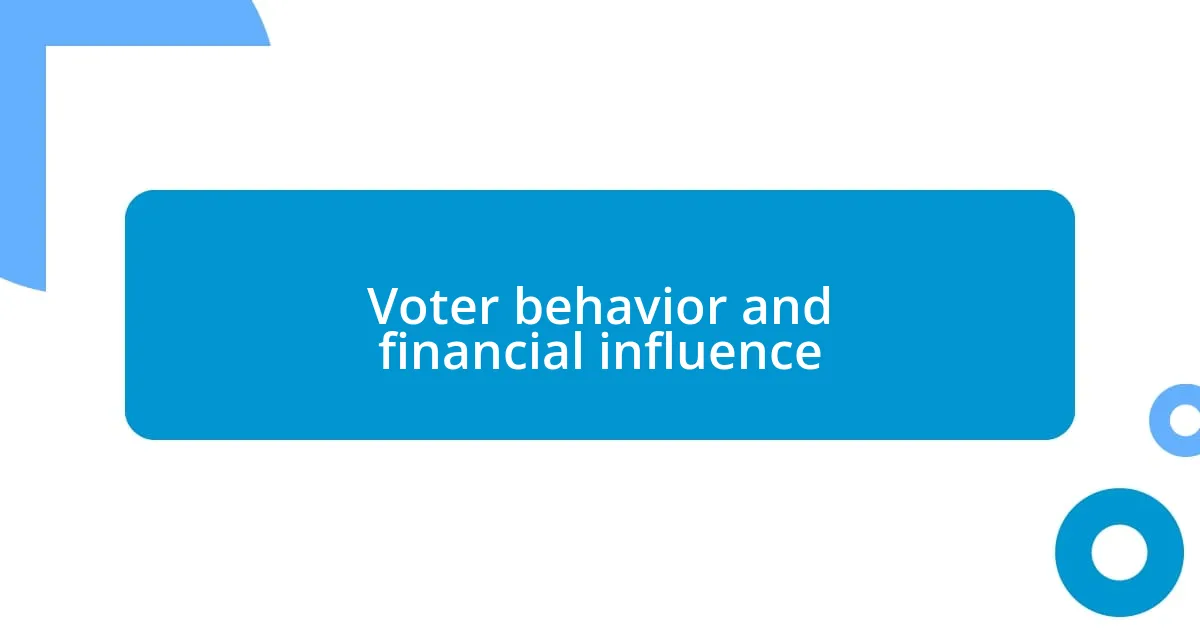
Voter behavior and financial influence
Voter behavior is deeply intertwined with financial influence, often manifesting in how candidates are perceived. I’ve noticed that during election cycles, candidates who can afford high-profile advertising often overshadow their opponents, regardless of qualifications. It raises a critical question: Do we, as voters, unconsciously equate financial backing with credibility? This line of thought certainly resonates with me.
When I reflect on the campaigns I’ve followed, the disparity in fundraising often translates to voter trust and engagement. I remember attending a local debate where one candidate had a polished approach, filled with buzzwords and captivating visuals, while another communicated authentic, community-focused ideas. Yet, it felt as if the latter was struggling to break through the noise created by the former’s financial might. Doesn’t this make you wonder how many valuable voices go unheard simply because they lack sufficient funds?
It becomes clear to me that money not only impacts visibility but also influences voter expectations. Many people, myself included, sometimes assume that the more money spent, the more credible the campaign. This notion can skew our perception, making it difficult to prioritize genuine passion and commitment over monetary power. As we ponder this reality, I can’t help but ask: How do we recalibrate our values as voters in an age where financial influence is so pervasive?
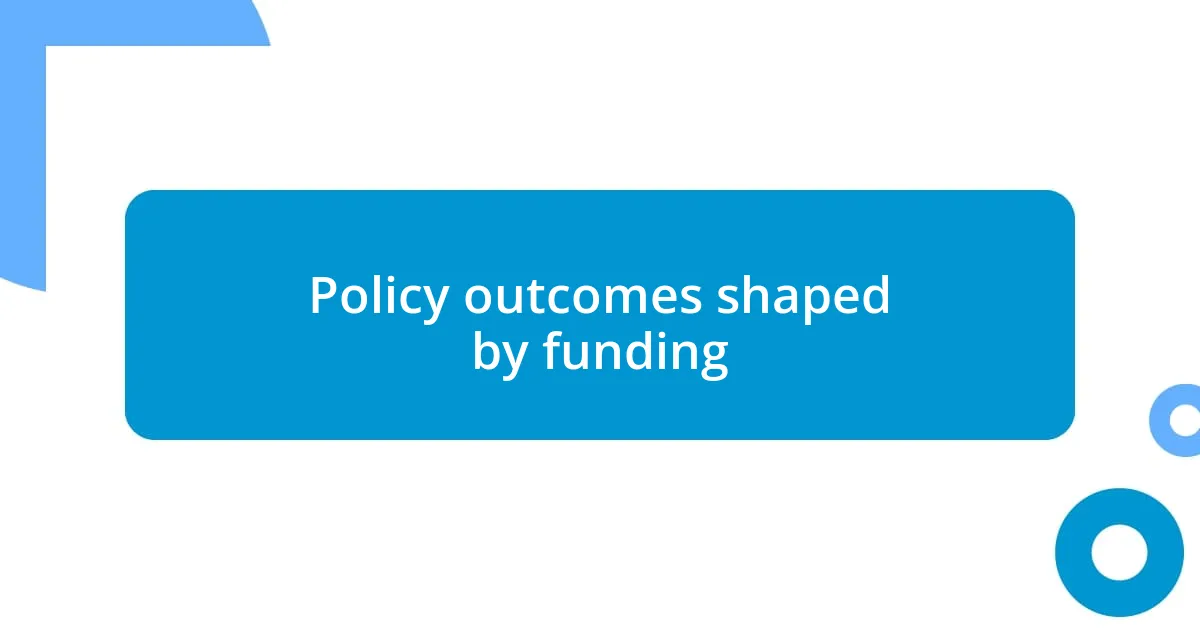
Policy outcomes shaped by funding
When examining how funding shapes policy outcomes, I think back to a project I volunteered for, aiming to advocate for environmental reform. We spent countless hours crafting a compelling proposal, only to face a wall of resistance from well-funded lobbying groups representing fossil fuel interests. It was disheartening to see how financial resources translated directly into influence over policy discussions, leaving our grassroots efforts feeling insufficient against a well-oiled machine. Isn’t it unsettling to realize that sometimes, the loudest voices in the room often aren’t the ones advocating for the public good?
Reflecting on this, I can’t help but feel the weight of such funding disparities. During a town hall meeting that I attended, a wealthy donor’s influence over local politicians became evident as they steered the conversation away from pressing community needs toward favored projects that benefited their bank accounts. It made me question: Who are our elected officials really serving? This experience really opened my eyes to the fact that the interests of those with deep pockets can dictate outcomes, leaving less affluent citizens grappling for representation.
At times, it feels like I’m watching a game where the rules are rigged from the start. In my observation, policy outcomes are often skewed towards those who can afford the most persuasive voices. For instance, I recall reading about initiatives that were squashed because the opposition could afford highly specialized consultants to thwart any progress. If anything, this reinforces a troubling notion: how much of our policy landscape is truly reflective of public interest versus that of those holding the purse strings? As I think about these dynamics, the question remains—can we find a way to ensure that every voice, regardless of funding, has a chance to be heard in our political arena?
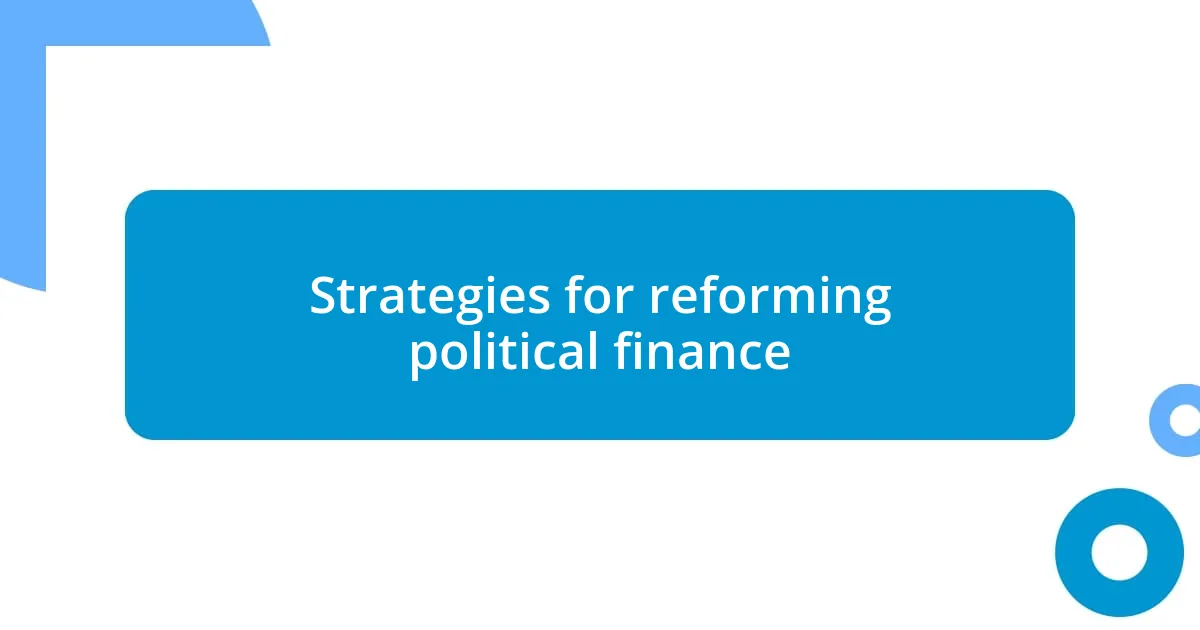
Strategies for reforming political finance
One effective strategy for reforming political finance is the establishment of publicly funded campaign programs. In my experience volunteering for local candidates, I often witnessed the stress that fundraising placed on campaigns. I remember one candidate who opted for a public funding model and experienced a refreshing sense of freedom. With less time spent chasing donations, they focused on engaging with constituents, which ultimately strengthened their connection with the community. Isn’t it amazing how a shift in funding can lead to a more authentic political dialogue?
Another approach could be setting strict limits on campaign contributions. From my perspective, these limits could create a level playing field where candidates with diverse backgrounds can compete effectively. I think back to a local election where an underfunded candidate proposed innovative ideas, but their message was drowned out by opponents with endless resources. If we were to impose contribution caps, wouldn’t it empower those overlooked voices and enable more grassroots participation? Such a reform seems not only sensible but essential for restoring faith in our political system.
Lastly, increasing transparency in political donations can profoundly impact political finance reform. I’ve observed how hidden donations can cloud the motivations of our representatives. There was a time when I stumbled upon a report revealing undisclosed funding sources influencing a significant policy change. It felt like peeling back layers of secrecy to unveil a troubling truth. If donors had to publicly disclose their contributions, wouldn’t that discourage unethical influence and encourage candidates to focus more on their constituents’ needs? Clearly, transparency could be a game-changer in rebuilding trust in politics.












